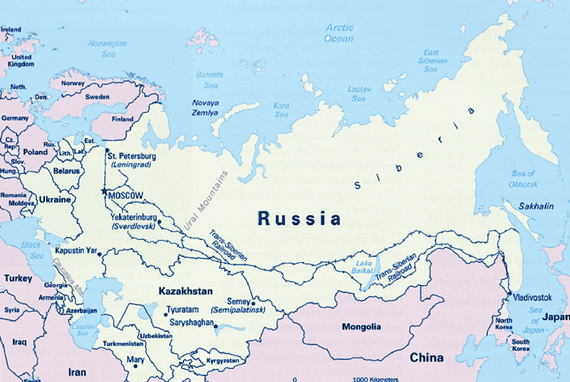Image: Map of the Former Soviet Union
It hasn't been a good year for Kazakhstan President Nursultan Nazarbayev.
The country's petroleum-based economy continues to suffer from the low price of oil.
Radical Islamists made international headlines by attacking a gun store and a National Guard facility in the western city of Aktobe early this month, killing 20 people. Kazakh authorities killed 18 radicals and arrested several during and after the attacks.
But the worst news for Nazarbayev was nationwide protests since May against the government's plan to increase from 10 to 25 years the length of time that foreigners can lease public land for agriculture.
That provision was part of a government land-privatization reform package aimed at increasing the amount of land under cultivation in Kazakhstan, the world's ninth-largest country.
Many Kazakhs rose up against the government in the mistaken belief that the new package allows the country to sell -- rather than lease -- land to Chinese farmers.
Kazakh officials contend that the Nazarbayev administration's political opponents spread the Chinese land-sale rumors to try to foment a popular uprising that would lead to a coup.
They are probably right. Political opponents elsewhere in the former Soviet Union have also seized on bread-and-butter issues to stoke popular unrest.
The best examples are uprisings over electric-rate increases in Kyrgyzstan and Armenia.
In many ways, using bread-and-butter issues to stoke unrest is smarter than asking the public to rise up for political reasons.
For one thing, most people in the former Soviet Union hold the cynical view that a change of government will simply replace one set of crooks with another, and do nothing for society. That means a lot of the public can't get excited about political appeals to them.
But they can get fired up about bread-and-butter issues that could affect their futures.
In the case of Kazakhstan, the bread-and-butter appeal is the contention that millions of Chinese farmers could flood into the country and refuse to leave, jeopardizing Kazakhs' livelihoods and making the country a virtual Chinese colony.
In the case of the electric-rate increases in Kyrgyzstan and Armenia, the bread-and-butter appeal was the contention that there would be less money in people's pockets for food, rent and other necessities.
The Kyrgyzstan rate increase actually led to President Kurmanbek Bakiyev's ouster in 2010.
Much of the public was unhappy with Bakiyev for other reasons, particularly the belief that he used fraud to steal his re-election in 2009.
But Bakiyev's decision to double electric rates was what ultimately proving his undoing by provoking the uprising that led to his fleeing the country.
Learning from the Kyrgyzstan situation, Armenian President Serzh Sargsyan took steps to co-opt street demonstrations against a 17 percent rate increase that the country's Russian-owned main utility planned for August of 2015.
Sargsyan announced that for an unspecified period the government would cover the difference between the old and new rates so that consumers wouldn't have to.
Armenia is one of the poorest countries in the former Soviet Union, so the rate increase would have taken a big bite out of people's incomes.
You can be sure that opposition forces in Kyrgyzstan and Armenia smacked their lips over the public anger that the rate increases generated. That anger presented them with an opportunity: If they could figure out how to channel it, they might be able to foment a general uprising that would usher them into office.
Russia was so concerned that the rate-increase protests in Armenia could lead to an uprising against its ally Sargsyan that it warned the Armenian public against trying to pull off a color revolution in the country.
Opposition forces across the former Soviet Union learned from the Kyrgyzstan and Armenian rate-increase uprisings that seizing on bread-and-butter issues may be a better way to precipitate regime change than using political appeals.
Kazakhstan officials became convinced that the opposition was using the land issue to try to spark a popular political uprising in the same way that the Kyrgyzstan and Armenian oppositions had seized on the electric-rate-increase issue.
To warn the opposition that it was treading on dangerous ground, Kazakh officials went public with their belief that those spreading the Chinese-land-sale rumors had the ulterior motive of trying to seize the bread-and-butter issue to precipitate a general political uprising.
For the time being, both Armenia and Kazakhstan have checkmated the opposition's use of bread-and-butter issues to try to foment a general uprising.
Having learned that bread-and-butter issues can be effective change agents, you can be sure that opposition movements are looking for the next one to seize on -- and that governments are brainstorming counter-measures.
Armine Sahakyan is a human rights activist based in Armenia. A columnist with the Kyiv Post and a blogger with The Huffington Post, she writes on human rights and democracy in Russia and the former Soviet Union. Follow her on Twitter at: www.twitter.com/ArmineSahakyann

